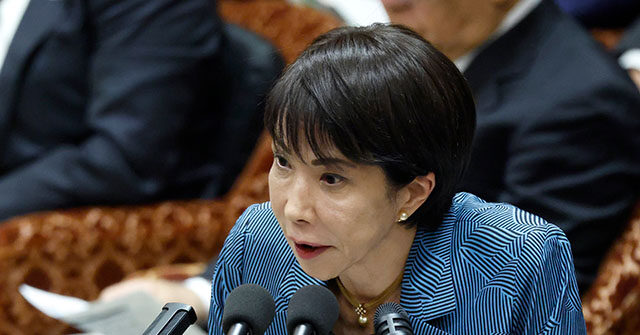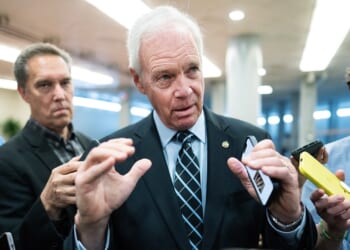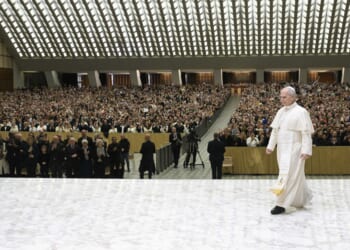Chinese Vice Foreign Minister Sun Weidong called Japanese Ambassador Kanasugi Kenji into his office for a tirade about Taiwan on Thursday, the latest escalation of a diplomatic row that has already seen one Chinese official threaten to cut Japanese Prime Minister Takaichi Sanae’s head off.
Sun lectured Kanasugi about the history of China, Japan, and Taiwan, and repeated China’s furious demands that Takaichi retract her comment that Japan would view a Chinese attack on Taiwan as a “situation threatening Japan’s survival.”
Takaichi made the comment on November 7 in remarks to her parliament, the National Diet.
“The situation regarding Taiwan has become serious. We must assume the worst-case scenario,” said Takaichi, who strongly favored Taiwan throughout her career as a legislator before becoming prime minister in late October.
The prime minister’s use of the phrase “survival-threatening” enraged China because even under Japan’s current pacifist constitution, the Japanese Self-Defense Forces (JSDF) are permitted to take military action under those circumstances. Takaichi is among the Japanese politicians who support amending the constitution to give the JSDF more latitude to take military action.
Kyodo News pointed out that several of Takaichi’s predecessors have made similar comments about taking action to defend Taiwan from a Chinese invasion – including her mentor, the late Prime Minister Abe Shinzo – although they have avoided using the specific “survival-threatening” language Takaichi employed.
China has always objected to these statements, but Chinese officials simply lost their minds when Takaichi talked about defending Taiwan. The obvious reason for the intensity of their anger is that Takaichi is a woman, the first female prime minister of Japan, so her tough stance in defense of Taiwan was especially insulting to China’s blustery “wolf warrior” pride.
Takaichi made it clear within a matter of hours that her address to Parliament did not signal any change in Japan’s posture, but Chinese officials were already competing with each other to see who could denounce her in the most hyperbolic terms.
Xue Jian, China’s consul-general in Osaka, won the competition by threatening to behead Takaichi last Saturday.
“That filthy head that has come charging forward on its own accord will have to be cut off without a moment’s hesitation. Are you prepared for that?” Xue huffed in a social media post that he later deleted.
Japanese officials reprimanded Xue for making “multiple inappropriate statements,” Taiwan’s presidential office said Xue’s behavior “clearly exceeded diplomatic etiquette,” and U.S. Ambassador to Japan George Glass chided the Chinese government for letting its “mask slip.”
“Time for Beijing to behave like the ‘good neighbor’ it talks repeatedly about — but fails repeatedly to become,” Glass said.
Embarrassment over Xue’s eruption only made the Chinese Communist regime angrier and more determined to “win” the diplomatic row by squeezing some sort of humiliating apology out of Takaichi. Chinese officials made increasingly strident demands for her to recant her statements without offering any apology for Xue’s inappropriate threat.
The writers at China’s state-run Global Times seemed to be having a nervous breakdown when they banged out a lengthy account of Vice Foreign Minister Sun Weidong’s harangue of the Japanese ambassador on Friday, without bothering to report a single word of Ambassador Kanasugi’s response:
Sun said that Takaichi openly made blatant and provocative remarks regarding the Taiwan region, even implying the possibility of armed intervention in the Taiwan Straits. The nature and impact of these remarks are extremely egregious. Despite China’s serious démarches and protests, the Japanese side still refused to change course and retrack the erroneous remarks. China expresses strong dissatisfaction and firm opposition to this, and lodges solemn representations and strong protests with Japan, Sun said.
Sun pointed out that Takaichi’s remarks related to the Taiwan region are gravely wrong and extremely dangerous. They constitute a flagrant interference in China’s internal affairs, seriously violate international law and the basic norms governing international relations, severely undermine the post-war international order, grossly violate the one-China principle and the guiding principles set forth in the four China-Japan political documents, sabotage the political foundation of China-Japan relations, and deeply hurt the feelings of the Chinese people. The 1.4 billion Chinese people will by no means tolerate such remarks, Sun emphasized.
Sun made a point of mentioning that this year “marks the 80th anniversary of the victory of the Chinese People’s War of Resistance Against Japanese Aggression and the World Anti-Fascist War,” which is the Chinese Communist Party’s lengthy moniker for World War II.
“Eighty years ago, the courageous Chinese people fought a 14-year bloody war to defeat the Japanese aggressors. Eighty years later, anyone who dares to interfere in China’s great cause of reunification in any form will definitely meet a firm response from China,” the vice foreign minister thundered.
Chinese Foreign Ministry spokesman Lin Jian added his own threats in a press conference, warning that if Japan “dares to intervene in the Taiwan Straits situation,” it would “constitution an act of invasion and be met with strong fightback from China.”
“China firmly opposes and will never tolerate this. Japan must immediately correct its mistake and retract the egregious statement, or it will have to bear all the consequences,” Lin declared, before dusting off the talking point that the Chinese People’s War of Resistance Against Japanese Aggression was just eighty short years ago, and Tokyo had better remember how that turned out for them.
“Today, when Takaichi again raises the so-called ‘survival-threatening situation,’ what exactly is her intention? Is Japan attempting to repeat the old path of militarism? Is it seeking to again turn against the Chinese and other Asian peoples? Is it attempting to overturn the post-war international order?” Lin wailed, as though Japan’s reasons for opposing a Chinese invasion of Taiwan were a baffling mystery.
“We will resolutely exercise our right of self-defense under the U.N. Charter and international law, and firmly safeguard our national sovereignty and territorial integrity. We sternly warn the Japanese side to deeply reflect on its historical crimes, immediately stop interfering in China’s internal affairs and making wrongful and provocative remarks that cross the line. Those playing with fire on the Taiwan question will get burned,” he warned.
Japanese Chief Cabinet Secretary Minoru Kihara struck a conciliatory tone in his own press conference on Friday, saying that his government has always hoped for “a peaceful resolution of issues surrounding Taiwan through dialogue,” although he also “strongly urged China to take appropriate action” against Xue for threatening to cut Takaichi’s head off, so his comments are unlikely to lower the temperature in Beijing.
Other Chinese hotheads have been itching to get in on the head-chopping action. Former Global Times editor-in-chief Hu Xijin, who now makes his living as a hyper-nationalist pundit, boasted that “China’s battle blade for beheading invaders has been sharpened to a very keen age.”
“If Japanese militarism wishes to come to the Taiwan Strait to sacrifice themselves on our blades, we will fulfill them,” Hu exclaimed.
Other editorialists at Chinese outlets such as the People’s Daily and state broadcaster CCTV muttered that Takaichi should “pay a price” for “shooting her mouth off.”
“Has her head been kicked by a donkey?” one of CCTV’s social media accounts asked.
Some Japanese politicians are asking their government to expel Xue for making his threat against Takaichi. Meanwhile, the Chinese Foreign Ministry warned Chinese citizens to avoid traveling to Japan, because Takaichi’s remarks have supposedly jeopardized their safety.


















